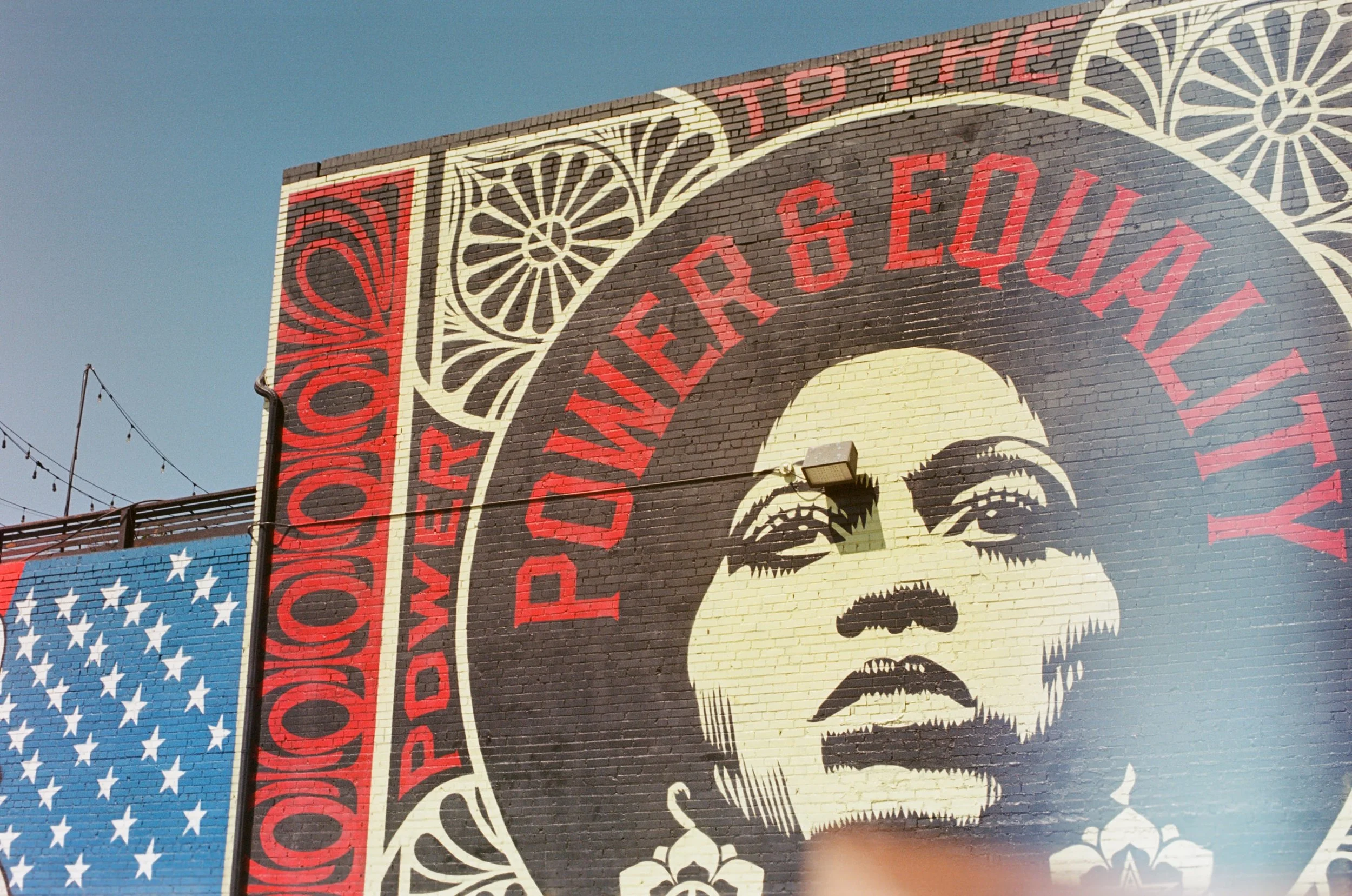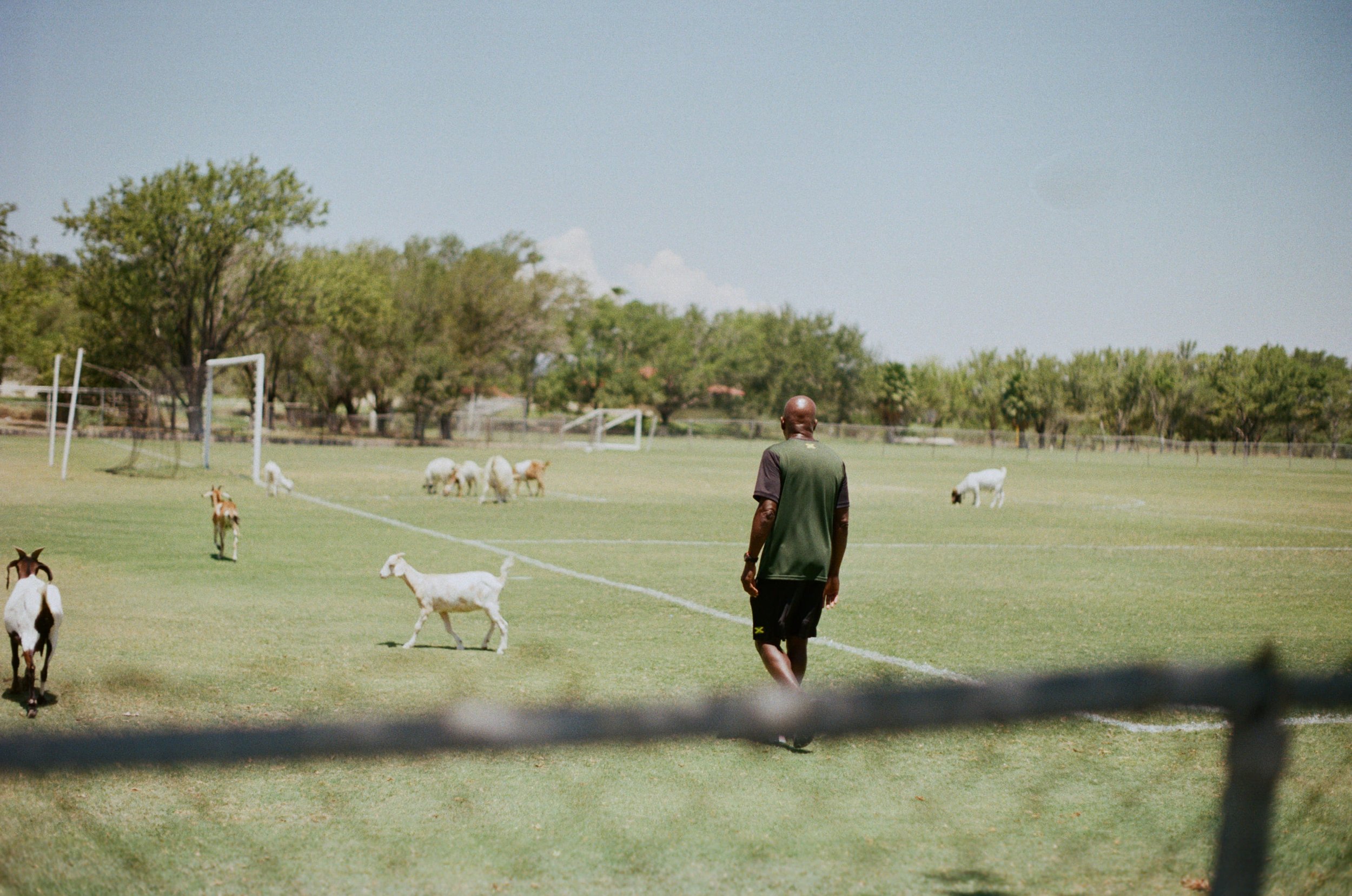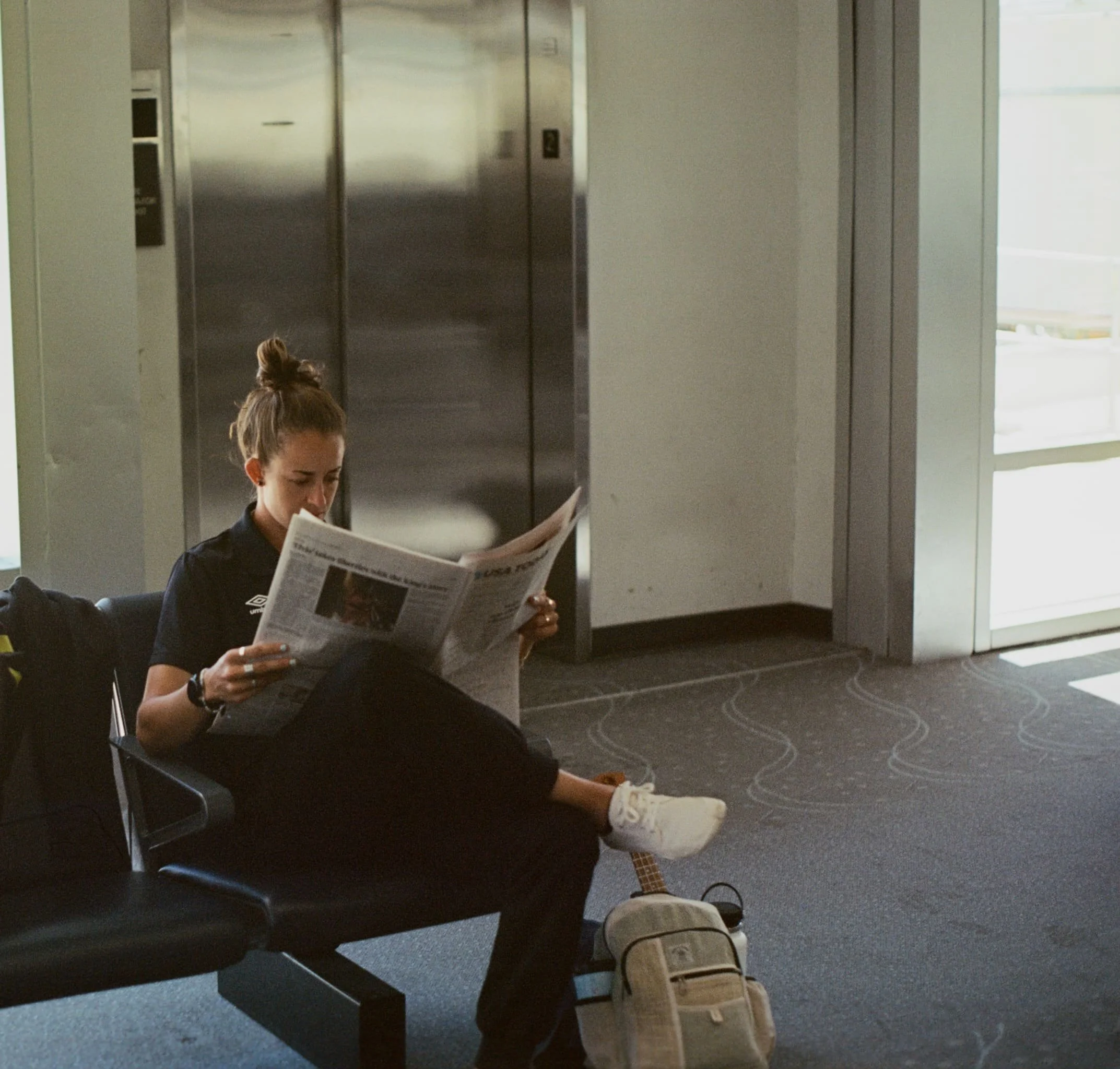Representation and Reggae Girlz
Yazmeen Jamieson, Jamaica
My name is Yazmeen Jamieson. I was born in Toronto, Canada to a Grenadian mother and a Jamaican father. I am currently playing for Simcoe County Rovers in League 1 Ontario in Canada. I was preparing for this World Cup with Jamaica since we kicked off our first round of friendlies in 2021. It was our first time getting the team back together since COVID and my first time being able to play soccer competitively in over a year. I moved to Sweden to play professionally, then back to Canada, and then to France.
I started playing soccer around 8 years old. My mom put me in soccer because I was not paying attention during my ballet classes and it was the cheapest sport at the time in terms of equipment.
I started playing as a striker, but I was thrown into goalkeeping because I was tall. I definitely hated the position. I did not fully transition into a goalkeeper until my first year of university. Before then I would play half my matches as a keeper and the other matches as a striker. I did not have any formal training as a goalkeeper, so I would watch YouTube videos of Karina LeBlanc and Hope Solo. Their games, highlights, training sessions, and interviews. LeBlanc really inspired me to lock into the position. Representation is important, so to see a Black Canadian/Caribbean female athlete was extremely inspiring to me.
Someone said to me recently “your road is long”. This means a lot to me because if you look at my journey, it has been anything but easy. I know for a fact that my road is still just beginning.
What did you try to show with the photos? Was there any wider meaning with the photos?
These photos are of my teammates on the Jamaican national team and my teammates from my club Simcoe County Rovers in Canada. These photos were taken in Miami and Denver (USA), Kingston (Jamaica), Monterrey (Mexico), Barrie and Toronto (Canada).
I tried to show the diversity of my team and the people I have been honoured to play with and against throughout my soccer journey. From our different hair textures, skin complexions, shapes and sizes, the Reggae Girlz are a mosaic of representation and I think that is beautiful. The motto in Jamaica is “Out of Many, One People” and I believe that our Jamaican team definitely reflects that.
Most of my photos are candid. This was important to me because I wanted to capture the environment and the moment untouched and unstaged. I wanted to show the joy in the little things, ranging from our competitive card games, to simply lacing up new cleats.
What are your favourite photos? Why?
My favourite images are a compilation of three photos. I asked my teammates Kadijah ‘Bunny’ Shaw, Jayda Hylton-Pelaia and Paige Bailey-Gayle to let me capture their hairstyles during our training camp in Colorado.
Within the Black community, hairstyles have been a way for us to express ourselves, differentiate tribes, send messages, and exude beauty. My mom always says to me “Your hair is your crown, wear it proudly”. It is inspiring to see Locs, different curl patterns, a range of braid styles, and Afros worn daily on our team. To be part of a team where I can ask and trust someone to braid my hair and they can relate to or understand my texture is a language that many people will never understand.
Growing up, I always felt insecure that I did not have a ponytail like the other girls or like the hair I would see on my trophies. I always wondered why the trophies never had an Afro or curly hair. It was always a straight long pony. When I came to the national team at 15 years old, I saw one of the older players playing in her Afro, another player playing with Locs, and another player with braids just like me. I felt at home. Not one word was spoken, our hair speaks for itself.
Are there any good stories connected with the people you photographed?
I met Trudi Carter when I was 15. I have watched her University career, professional career and international career over the past 10 years. Her personal journey is admirable and filled with resilience to say the least. I have roomed with Trudi during camps over the years and I know her training routine and game day routine.
It is easy to briefly glance at a player getting ready for a training session and think nothing of it. But I watched Trudi, how she meticulously set up her cleats, how she did not look left or right but was solely focused on her process to get ready for our session. Preparation starts before you even step foot on the pitch, it starts not only physically but mentally. Knowing this in-depth routine felt like a secret. Nobody is really paying any attention to what she is doing specifically, but if you take the time to stop and really look, we all have our own process.
What is one thing you always do to prepare before a game?
Not to be dramatic, but I will die without my headphones. I will listen to music or white noise right up until the final second that I have to get onto the pitch. When I can get away with it, I have done my dynamic warmup with my headphones in.
I was officially diagnosed with ADHD in 2021. While I did not know it at the time, music was really saving me. It kept me balanced, it allowed me to not get overstimulated by external noise or movements and once I discovered white noise, that was my key to success.
I do not like to eat much before a match, so I will always have a strawberry-banana smoothie with vanilla whey protein and half a slice of a bagel (I will not change this, ever!). I like to start my music off with Gospel (praise the lord), then into some Dancehall and Soca, and then finish off with white noise. Right before kick-off, I like to touch both posts and the crossbar, then say a quick prayer for myself and my teammates.
What are the opportunities and challenges for women’s footballers in Jamaica and Canada? What changes have you seen in women’s football since you started playing?
The opportunities to play soccer in Canada and Jamaica are very different. In Canada, we have a system that goes from grassroots to University and semi-professional. The Canadian women’s national team won Olympic gold, have made history countless times and yet, we still do not have a fully professional women’s soccer league. When I first started playing soccer in Canada, I knew that I would eventually have to leave the country in order to pursue a professional career.
In Jamaica, we are slowly building a steady system from the ground up. The Jamaican National Team was disbanded in 2008. If it were not for Cedella Marley, I probably would not be speaking about our team and the World Cup right now. It is through her support, love, admiration for our team and our country that we are still here today.
Resources have been the biggest challenge. It is sad to think that the barrier between a little girl in Jamaica and a little girl in Canada pursuing her dream is money, not talent. I often think about the talented female athletes who never got to explore their full potential due to the lack of stability within women’s sports. I often wonder if I have made a mistake by continuing to pursue this passion, knowing that it is not always a guaranteed way to put food on the table.
In Canada things need to improve drastically in terms of the funding, exposure and opportunities that are invested into women’s sports. In Jamaica we need funding, support from our government and corporate Jamaica. The talent is already there, it just needs to be developed.
On a positive note, the biggest change that I have seen within women’s football would definitely be the growth of broadcasting rights. Growing up, I would never turn on the TV, flip through channels and accidentally stumble across a women’s soccer game. Now, I can watch different women’s leagues across the world without a VPN and a sketchy streaming website. Exposure sparks interest, interest sparks viewers, viewers spark support and support sparks revenue. All we need is the platform to showcase ourselves.
What role does football play in your community and Jamaican society?
In my community, football is an opportunity to get an education. Yes, it started off as just a game, but being raised by a single mother I knew that I had to work hard and make use of my skills in order to make it on my own.
Football is a way to connect with your society and escape hardships even if it is just for 90 minutes. It can unify people even if you do not speak the same language. In Jamaica, you can find people playing football anywhere. With us qualifying for two World Cups back to back, football is another way to bring Jamaicans together and make everyone proud.
What are your personal ambitions for the future?
My ambitions for the future are to play soccer for as long as my body allows and as long as the fire stays burning inside my heart. I want to go back to Europe to play soccer professionally for a few years or on whatever continent helps me develop as a player and reach my full potential. Once that chapter of my life is satisfied, I want to complete my master’s in Public Relations or business and then work for either the United Nations, CONCACAF, FIFA or in a field that revolves around social justice and human rights.
What does the future look like for women's football? What do you want/expect to change after the 2023 Women’s World Cup?
I see women’s football becoming just as mainstream as men’s football. Some people might argue against this, but it has been proven that when we are given consistent exposure, there is interest. If you look at teams in Spain and England, they have been selling out stadiums and consistently breaking record attendances. I see this trend continuing and occurring across many different countries around the world. I also see larger corporations and other professional male and female athletes investing in women’s sports, therefore further growing the game.
The biggest change that I want to see within women’s football is the gap between the top teams and the lower ranking teams to close. This is for club football and on the international stage. We have already seen this at this World Cup, the “underdogs” cannot be underestimated anymore. FIFA expanding the number of teams being able to qualify for this World Cup was a game changing decision. Teams that would never be given the platform to showcase their talents have entered this World Cup with force and have made their mark. It is all about opportunity and exposure.




















